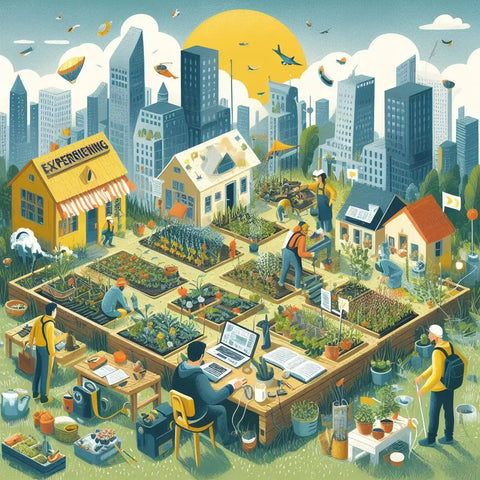The Rise of Urban Permaculture
The Role of Experiential Learning in Urban Permaculture Projects
Urban permaculture projects are becoming the core of a practical and all-encompassing process of making our cities resilient and regenerative in the era of worldwide urbanization and growing social concern about environmental sustainability. The core of these ambitions rests on the foundation of experiential education, which has an experiential approach as its core principle and puts emphasis on involvement, hands-on experience, and deep connection with nature. The role of experiential learning in urban permaculture projects is that it enables people to get a practical grasp on the many skills through hands-on projects, cultivates a sense of guardianship, and creates a meaningful understanding of the complex relationship that supports all living beings.

Defining experiential learning
Experience learning is an educational theory based on the belief that the best knowledge is gained through practical experiences sufficient to make students advance in learning and master the skills. In contrast to conventional instruction that is comprehensively based in the classroom, which commonly calls for passive reception of information, experiential learning throws students into real situations, makes them face challenges, and consequently, makes them reflect on what they have gone through. This concern points out that the real grasping of the issue and self-development come when people are given a chance to use theoretical concepts in real-life scenarios.
The Role of Experiential Learning in Urban Permaculture Projects.
Such urban permaculture is akin to vivid environmental laboratories, molding practical learning spaces out of real-life situations. At the same time, when they humanize the given sentence, they have the advantage of doing physical work, which helps them gain invaluable skills and knowledge that are different from what they hear. The Role of Experiential Learning in Urban Permaculture Projects. The role cuts across the different sectors, touching on the success and sustainability of these initiatives.
Skill Development
The experiential learning aspect of urban permaculture initiatives offers the practice of the skills that are crucial for sustainable living as an important mission. The participants will experience direct participation in learning techniques like composting, wastewater conservation, cultivation, and plant propagation, along with ecological design principles. These activities enable them to gain another level of insight into the importance and realities of these interconnections in the natural environment. Moreover, they strengthen their competence to translate these newly acquired skills into their routine lives.
Fostering ecological literacy
Environmental advocacy is inseparable from understanding the ecological systems that comprise urban permaculture projects, and by providing those experiences, we can develop ecological literacy, the single most important component of environmental sustainability. Using interconnecting living systems, carrying the cycle of nature, and the influence of human activities on natural resources, participants get a whole new experience as they delve deeper into their understanding of the environment. So, this sensitization will show them the way to their hearts and induce them to develop more ecological habits in their everyday lives.
Establishing and maintaining communal sentiments and social harmony.
Urban permaculture projects, while performing mostly the same fight the community and social belongingness by gathering different groups. The experiential learning in these classrooms inculcates cooperation, knowledge sharing, and network development while also giving rise to social skills. People attending learn how to collaborate, cherish diversity, and take pride in the communal experience that closes the gap and unites us on our journey to a more green planet.
Personal growth and empowerment
Watching an urban permaculture project through experiential learning would not cover local issues or related technology, help address environmental and social problems, or give feedback. It also enables people to learn and become independent, which builds empowerment. Through the process of creating their organizational norms, people realize a sense of belonging, which in turn results in an increase in the level of personal responsibility for their actions and a greater desire to contribute to positive changes.
Experiential learning applying the principle of urban permaculture could have many pros and benefits.
Contextualized Learning
Experience-based teachings in urban permaculture projects provide place-based learning where perception is processed and knowledge is acquired at the exact location and time of learning. Through this strategy, the field of applicability as well as the relevance of the gained knowledge improved; thus, there is a greater possibility for retention, and mental processing will be easier as well.
Hands-on Engagement
Personal experience learning in urban permaculture projects is not like passive learning methods at all; they instead stimulate the active engagement of students, and it has been proven that it deepens their comprehension and enhances their retention. Tactile involvement in performative processes leads to muscle memory development and strengthens the feeling that tasks being performed are real, hence facilitating the embedment of knowledge and skills gained during the process.
Problem-solving and critical thinking
Intriguing issues facing urban permaculture project growth usually demand resourcefulness and problem-solving ingenuity, as well as critical thinking. In such a way, through experiential learning, students have the culmination of putting the learned knowledge into practice, thus further enhancing their inherent problem-solving skills, which could be applied in various aspects of their lives.
Emotional Connection
Living and learning with urban permaculture projects help individuals establish ties to their surrounding natural and urban worlds. Through this, the people purposefully engage in the land, plants, and ecosystems, which results in the creation of a lasting sense of conservation as well as stewardship that may further encourage the people to observe sustainable practices in the long term.
Lifelong Learning
Learning by doing creates an environment where the mindset of a lifelong learner and the sharp skills that facilitate adaptation develop. Feedback comes directly from urban permaculture projects, and as projects evolve with new challenges encountered, the community is encouraged to keep acquiring new skills, trying out new practices, and refining their methods continuously. This culture of eternal progress and improvement emerges eventually.
Conclusion
Experiential learning in urban permaculture projects may be the most integral factor. Through the facility of interactive and skill-based activities, such endeavors help people build working skills.
It contains various aspects that will help them become environmentally conscious, create a sense of community, and develop their personal growth. Through experiential learning, the classroom is broadened, the nature of student education expands beyond the familiar walls of the classroom, and a meaningful connection with the environment as well as the commitment to live sustainably are established.
FAQs
How are some experiential learning activities used in urban permaculture projects constructed?
Demonstrated practice-based learning for in-city permaculture programs includes, among other things, composting, reducing water consumption, propagating plants, abiding by ecological design principles, maintaining community gardens, and jointly resolving problems. The learners thoroughly take part, as these procedures are carried out with them practically involved in the learning process.

What do hands-on learning and skills entail?
As for experiential learning in city permaculture projects, the participants will not only learn useful skills but will also become more knowledgeable in practical matters, including activities such as composting, water conservation, and plant propagation. Through the implementation of these practices, teens will see the results of their work and gain courage and higher knowledge of these skills, which can be useful in their lives.
Can experiential learning catalyze community spirit?
Indeed, community plans and projects that use urban permaculture often bring together a diverse group of people who also learn by experiencing this setting. Engagement in this type of learning promotes the development of collaborative and interpersonal skills and the sharing of ideas. The members develop the skill of working together as a team, taking into consideration diverse opinions, and understanding the importance of cooperation in the journey to a more sustainable future. Therefore, the relationship is improved, and the community as a whole becomes more tightly knit.





Leave a comment